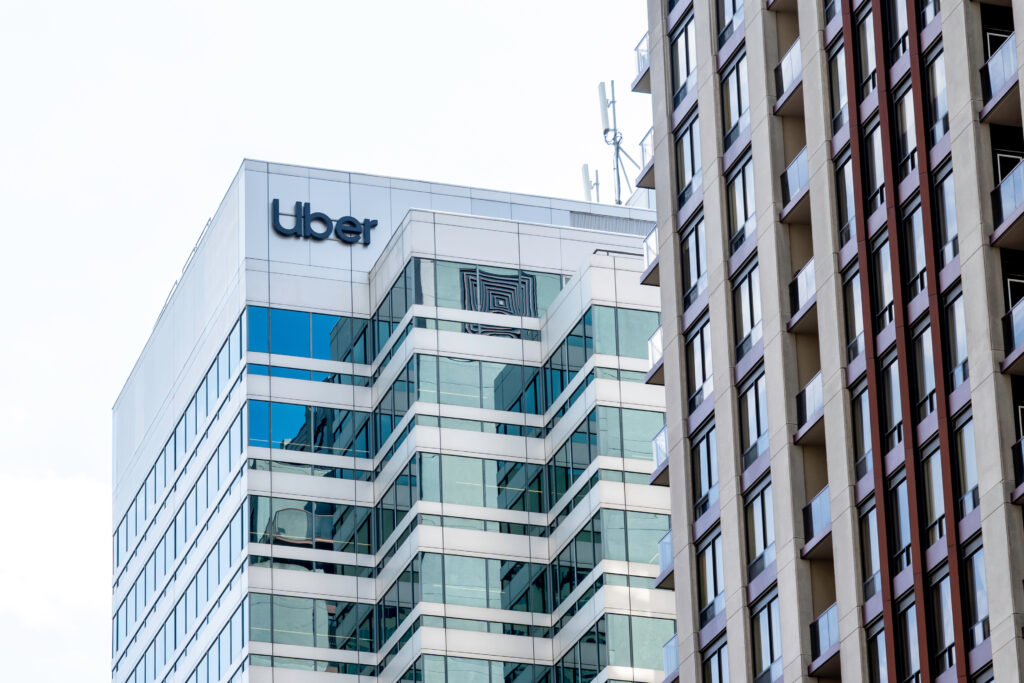

Features
Gig Economy
Legislation
B.C. to revamp workplace laws to safeguard gig economy workers, including minimum wage and tip protection
November 20, 2023
By
Todd Humber
 The Uber sign on its engineering hub building in Toronto. Photo: JHVE/Adobe Stock
The Uber sign on its engineering hub building in Toronto. Photo: JHVE/Adobe Stock British Columbia is making changes to its workplace legislation to provide better working protection, including basic employment standards, for gig economy workers. That includes establishing a minimum wage, rules around vehicle expenses, and tip protection.
“The workers who appear at the touch of a button to drive us home or deliver our dinner deserve to be treated fairly,” said Harry Bains, Minister of Labour. “That’s why we’re taking action to address the problems that the workers themselves raised. We know how important these services are to people in B.C. and our goal is to balance the needs of workers while supporting the continuation of these services.”
The province said that while app-based ride-hailing and food-delivery workers value the flexibility of these jobs, many have expressed concerns about low and unpredictable wages or being cut off from the job without warning. Many also lack workers’ compensation coverage if injured on the job, it ssaid.
“Some newcomers to Canada face language barriers or other challenges that make it difficult to find a job, and app-based work can provide a quick source of income,” said Janet Routledge, Parliamentary Secretary for Labour.
“We’ve been listening to gig workers all across the province during the engagement roundtables about the challenges they are facing, and these standards reflect what we have heard. All workers, regardless of where they’re from or what they do, deserve minimum employment standards and protections.”
Minimum wage
The changes would establish an earnings standard of 120% of the province’s minimum wage (currently $16.75 per hour) and apply it to “engaged time.”
Engaged time begins when a worker accepts an assignment through to its completion. It does not include time spent waiting between assignments, which is the rationale for adding the 20% premium.
Platform companies will be expected to top up the difference when the earnings paid in a pay period don’t meet the minimum earnings standard for the engaged time worked, it said. Tips are excluded from the minimum earnings calculation.
Expenses
British Columbia will establish an additional compensation standard to recognize the costs incurred when workers use their personal vehicles.
The province said it will be consulting with workers, platform companies and others to determine an appropriate standard.
Pay and destination transparency
B.C. also wants gig workers to know, in advance, what the pay will be for taking and completing an assignment.
Platform companies will also be required to provide workers with wage statements every pay period so workers can ensure they are paid correctly.
They will also need to provide workers with all pickup and delivery locations for each assignment, a move it said will allow workers to assess the desirability and safety of assignments before accepting them.
Suspensions and terminations
Platform companies will be required to inform workers, in writing, of the reason for suspension or deactivation of their accounts.
They must also provide a review process to allow workers to present their side and supporting evidence. In response to a review, platform companies will be required to provide a written explanation of their final decision.
They will also be required to give written notice or compensation for the length of service if they want to terminate a worker’s account unless there is just cause for termination.
Workers’ compensation coverage
Ride-hailing and food-delivery workers will receive workers’ compensation coverage from WorkSafeBC, the province said. Workers will be eligible for workers’ compensation benefits, including vocational rehabilitation services, for work-related injuries.
Platform companies will be responsible for:
- registering for coverage with WorkSafeBC and paying premiums;
- following health and safety rules to keep workers safe;
- reporting injuries and diseases; and
- investigating significant incidents.
Areas not covered
The province said it does not intend to issues rules around hours of work and overtime; statutory holidays; paid leaves; and annual vacation.
But it said it will continue to “monitor” those areas.
Reaction from labour
Unifor said the proposed regulations are commendable and long overdue. but criticized them for stopping short of giving gig economy workers the full employment rights that “all Canadians deserve.”
“Powerful digital platform employers have come to rely on precarious employment, and governments can and must raise the floor for gig workers,” said Lana Payne, Unifor national president.
Classified in most jurisdictions as “independent contractors,” gig workers have been unfairly denied basic workplaces rights — including the right to form unions and collective bargaining, it said in a press release.
It wants gig economy workers to have the full protection of workers under the Employment Standards Act, including daily minimum pay, overtime and paid vacation time.
“The B.C. government is building a basic floor for gig worker rights that most governments in Canada have failed to do. That’s commendable,” said Gavin McGarrigle, Unifor western regional director. “However, there’s a difference between rights on paper and in practice. Gig workers must have equal representation under the law and the tools make the employer accountable.”
Unifor has previously called on governments to introduce a sector-based collective bargaining model tailored to gig workers, empowering workers to negotiate strong industry standards and resolve workplace disputes.
Print this page
